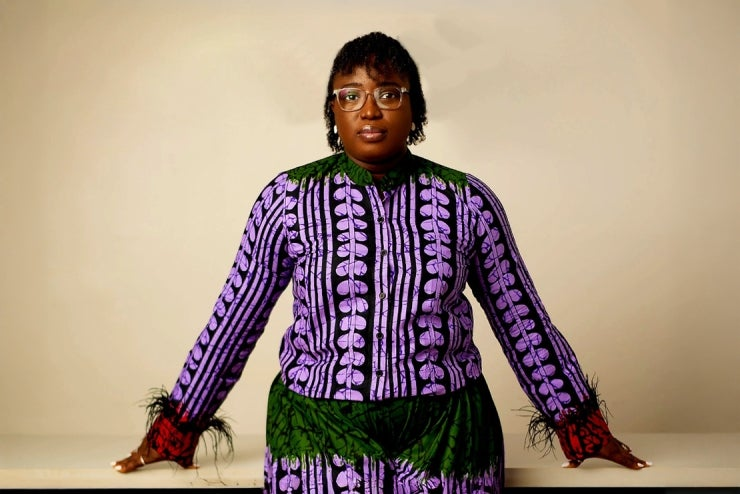Nigerian activist Bukky Shonibare is hoping the University of Toronto can help her bring an international fight for justice into the age of artificial intelligence.
As co-founder of the #BringBackOurGirls movement, launched after 276 Chibok schoolgirls were abducted in northern Nigeria by Boko Haram in 2014, Shonibare brought worldwide awareness to the issue by holding up a placard every day for five years - no matter where she was in the world.

PhD student Bukky Shonibare's research at the intersection of law, policymaking and technologies such as AI aims to ensure justice for women and girls, particularly as it relates to sexual violence (supplied image)
Her efforts garnered global media attention, earned her an invitation to speak at the UN General Assembly and helped draw high-profile supporters to the cause, including former U.S. First Lady Michelle Obama and Pakistani activist Malala Yousafzai.
"One of my supervisors called it affective justice," says Shonibare, who completed a master's degree in international human rights law at the University of Oxford and is now pursuing her PhD at U of T's Centre for Criminology and Sociolegal Studies in the Faculty of Arts & Science.
"We used emotions as sentiment to galvanize the world to pay attention to the young girls who had been abducted."
At U of T, Shonibare is studying criminology and policy making, law and state power and research methods - and her research at the intersection of law, policymaking and technologies such as AI is focused on ensuring justice for present and future generations of women and girls, particularly as it relates to sexual violence. Her supervisors include Kelly Hannah-Moffat, a professor of criminology and sociolegal studies, and sociology, who is U of T's vice-president, people strategy, equity and culture, and Kamari Maxine Clarke, a distinguished professor in the Centre for Criminology & Sociolegal Studies and the Centre for Diaspora & Transnational Studies.
"One of the problems for survivors of sexual violence is sometimes you don't want to talk to a human being who will judge you," says Shonibare, who grew up in Lagos and is a survivor of sexual abuse herself.
Her plan? Gather and preserve survivors' testimonies via an AI-powered virtual assistant she has named Keepit. That way they have the option of pursuing legal action in the future, she says.
"Keepit will rely on natural language processing, machine learning and cloud computing to understand, respond and provide support to survivors of sexual violence," says Shonibare. "For example, a survivor might say, Hey Keepit, I need to talk about what happened last night,' and Keepit would respond with, I'm here to listen. Take your time. You can start whenever you're ready.'"
Beyond voice and text empathetic conversation, Keepit will support evidence preservation, legal preparation and referrals for survivors.
In addition to her work with #BringBackOurGirls, which vows to continue its 10-year-old campaign until all of the women have been released, Shonibare is the executive director of Invictus Africa, a social enterprise that promotes human rights and gender equality through data-driven advocacy, while leveraging digital technology, engaging stakeholders and building capacity.
She also developed SheTV, an online TV and podcast platform dedicated to women and girls, and Adopt-A-Camp, which provided humanitarian assistance to internally displaced persons.
The years of field work have taken their toll.
"I was going to a whole lot of dangerous places until one time when I had a near-death experience - and professionals advised me to pull back from the northeast because, at that time, Boko Haram was abducting a lot of humanitarian aid workers."
In Chibok, they call her "Kwatuwa," or female warrior, she adds.
Hannah-Moffatt says Shonibare's dedication to social justice and community betterment is inspiring.
"Bukky's profound desire to make a positive social impact is reflected in her research on how digital technologies can empower and ensure the safety of women and girls," says Hannah-Moffatt. "Her development of Keepit is a critical initiative that offers survivors a safe and empowering platform to share their stories through AI-powered, voice-activated technology.
"Her work not only advances technology but also uplifts and empowers women and girls by building a community that supports recovery and strength."
Clarke adds that Shonibare's work is not only on the cutting edge of new social justice developments but also offers important avenues for understanding the place and limitations of AI in a changing world.
"This work is at the cutting edge of sociolegal studies and provides ways to think about not only violence but the importance of information, inquiry and political action," she says. "Her work has the potential to transform justice possibilities for women and underserved communities around the world."
Shonibare, for her part, sees it as an evolution of her years working on the front lines.
"The impact of my research will be to show ... how technology, particularly AI, can be used to ensure justice for survivors of sexual violence."










